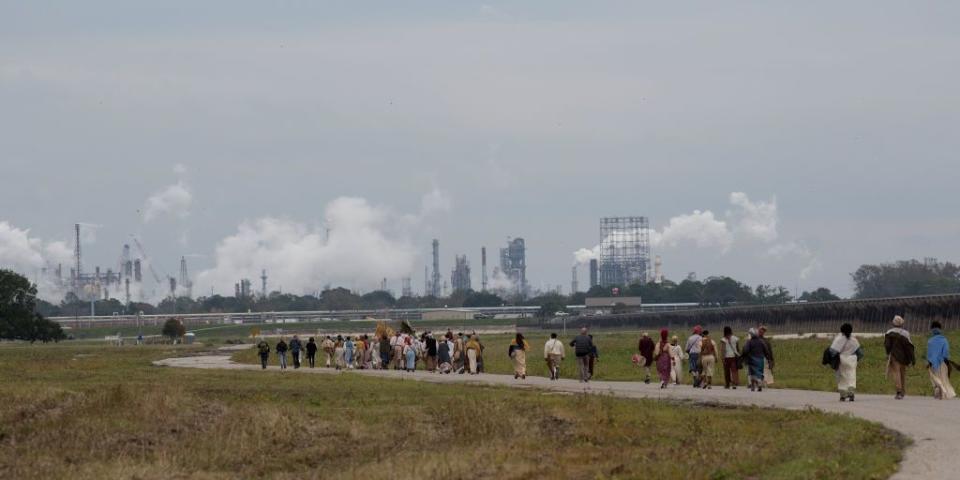A Corporation Ignoring a Whistleblower About Disruption to a Historic Site? You Don't Say

A while back, the shebeen discussed the Louisiana Bucket Brigade, a group of activists fighting a huge plastic plant proposed for a poverty-stricken, environmentally lethal slice of that state called St. James Parish. From the Washington Post:
Then the local landmarks began to disappear. Woodrow’s grocery closed down. The St. James sugar co-op ground to a halt. The cleaners and post office shut their doors for lack of business. Heavy manufacturing moved in. Duck’s Grocery sold out to a rail car and crude-oil storage facility. The high school football field was overrun by subsidiaries of a Chinese company and the Koch family’s corporate empire, which teamed up to build a huge petrochemical plant. Buena Vista Baptist Church now worships a couple thousand feet from a methanol plant and asphalt depot.
The LBB is fighting against Formosa Plastics, a Taiwanese corporation that wants to drop a $9.4 billion mega-plant into this same small place. Anyway, the Brigade tipped us to a ProPublica story about another small place in Louisiana and how a large corporation is trying to bully the town out of its own history.
Edwards’ report detailed how a proposed $400 million grain elevator, almost the height of the Statue of Liberty, would disrupt sites that are both sacred and dedicated to educating people about slavery and its aftermath. These included homes in the 750-person community of Wallace, an African American cemetery and the nearby Whitney Plantation Museum, which serves as a memorial to generations of people forced to work the fields against their will. The draft said vermin, loud noises and ground vibrations would likely invade the quiet space of the museum, which draws tens of thousands of visitors each year. For many residents of Wallace and nearby communities in St. John the Baptist Parish, the site holds deeper meaning. They are the descendants of people who’d once been enslaved there.
An agricultural company called Greenfield had purchased the land for $40 million in 2021 and is seeking a permit from the Army Corps of Engineers to build a massive industrial operation that would include 54 grain silos. A long conveyor would carry millions of tons of wheat, soy and other crops to the facility from ships docked on the river. Gulf South Research Corporation, where Edwards worked, was hired to help Greenfield comply with a section of the 1966 National Historic Preservation Act that requires development projects funded or given a permit by federal agencies to document significant sites and come up with a plan to minimize harm. The law gives agencies like the Corps authority to deny permits if a proposed project cannot be reshaped to avoid harming sites with historic significance.
So Ms. Edwards did her job and reported that the project indeed would be disruptive to a historically significant site, one that included an old plantation and a burying ground for the enslaved people who’d worked it. Imagine her surprise when her company submitted a version of her report that was free of all that pesky historical data and recommending that the project be allowed to go forward.
The rewrite came after the contractor Greenfield hired to handle the permitting process pressured Gulf South, according to emails obtained by ProPublica. Gulf South was warned that if the firm didn’t take out Edwards’ key finding—that the entire area was a historic district—it would lose the contract.“They are refusing to accept it,” Gulf South’s head of cultural resources, Mike Renacker, wrote about Edwards’ report in an email to an internal team. “They are willing to tear up the contract and fire us.” As written, the report “has the potential to not only cost us our contract and future work, but might end the overall project as well.”
It’s hard not to connect this bureaucratic muscle flexing to the general move toward expunging the inconvenient facts about American history from our classrooms and libraries. The problem is that there are citizens you are expunging, too, some of them with life histories that tell us more about American history than any textbook ever would.
Her grandparents had labored and lived on the Whitney, where wage workers were bound through credit to the plantation store, a whole century after the Civil War. They had cared for Grows, she said, after her mother was injured in a cane fire. She and her husband raised their children in Wallace. Grows worked as a cook at the local high school. Her husband worked at a grain elevator across the river. Her son, who was visiting Grows on that May morning, recalled coming home from school years ago and earning pocket change picking vegetables.
Grows said she did not know exactly what the grain elevator would mean for her and her home. She’s heard some people in her community say that the project would make it difficult to remain in these houses. “A lot of people say it’s going to cause all sorts of problems.”Three decades ago, another company had nearly begun building a plant on the same land. She’d prepared to leave. But the plans were scrapped. “If we had to move all of a sudden that would be something. I’ve been here. My daddy was living right there,” Grows said. “All these people on this little land are kinfolk.”
If the country loses this simple truth, it loses a great deal of its rationale for existing at all.
You Might Also Like
